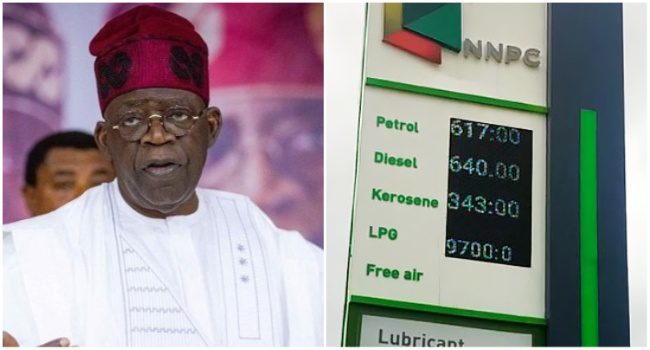In a significant fiscal development, the Federal Government of Nigeria has successfully saved approximately N1.45 trillion from the removal of subsidies on Premium Motor Spirit (PMS), commonly known as petrol, over a four-month period from June to September. This substantial savings figure, according to data from FAAC (Federation Account Allocation Committee) allocation documents, has been remitted into the Non-Oil Revenue (Savings) account of the government.
The breakdown of the funds remitted to the government account shows that N696.93 billion was recorded in June, followed by N389.7 billion in July, N71 billion in August, and N289 billion in September. This significant financial achievement has provided a significant boost to the government’s coffers.
The removal of petrol subsidies was announced by President Bola Tinubu in his inaugural address on May 29, 2023, marking a transformative shift in the country’s economic policies. President Tinubu stated, “Subsidy is gone,” signifying a decisive move towards fiscal responsibility.
Before the removal of subsidies, the Nigerian National Petroleum Company Limited had incurred substantial costs in subsidy payments, totaling N1.828 trillion between January and May 2023. This amount represented a 55% increase compared to the corresponding period in 2022, highlighting the considerable financial burden the subsidies posed to the government.
The first four months of 2023 saw a breakdown of subsidy expenditures, with N274.769 billion in January, N477.742 billion in February, N415.381 billion in March, and N353.130 billion in April, respectively.
On August 1, 2023, President Bola Tinubu announced in a nationwide broadcast that the Federal Government had saved N1 trillion in just two months, June and July, since the removal of petrol subsidies. He emphasized that these saved funds, which were previously susceptible to exploitation by “smugglers and fraudsters,” would now be channeled into essential intervention programs benefiting families across the nation.
However, the government’s claims of savings have sparked discussions and inquiries. Trade Union Congress president, Festus Osifo, raised questions about the utilization of these saved funds, expressing concerns over the government’s borrowing practices. Osifo argued that with N1 trillion in savings, there should be no need for further borrowing, urging the government to direct a portion of the saved funds towards benefiting Nigerians.
In response to these inquiries, the Minister of Information and National Orientation, Mohammed Idris, clarified that the government had indeed made substantial savings through the subsidy removal. He explained that a significant portion of these funds had been transferred to state governments to help mitigate the impact of the policy on the Nigerian populace. Minister Idris emphasized that state governments, being closer to the people, were well-positioned to deliver effective relief measures.
While the exact amount of savings transferred to state governments was not disclosed, the minister assured that the initiative was an ongoing effort. The removal of petrol subsidies and the subsequent savings have become a focal point in Nigeria’s economic landscape, with continued scrutiny and debate over how these funds are being utilized to benefit the nation’s citizens.









